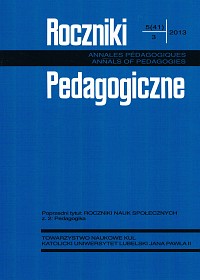Controlled Formation of Verbal Generalizations as the Basis of Mastery in the English Language in Terms of Hearing Loss and Severe Speech Impairments
Main Article Content
Abstract
The aim of following article is to describe a glottodidactic experiment investigating whether persons with hearing loss and sever speech impairments are able to create lexical- grammatical generalizations of concepts in English. The opening thesis statement indicates that there are three types of verbal generalizations: lexical, grammatical, and lexical-grammatical, as well as the fact that in ontogenesis each type of generalization is acquired in stages (4 stages).
A little child, in order to build the system of lexical and grammatical generalizations needs to perform a great analytical work. In the experiment three groups participated: a group consisting of subjects with hearing loss (15 people), with severe speech disorders (16 people) and the control group of hearing, healthy people (15 people). The findings from the research showed that those tested who were from the main groups achieved slightly lower results than the subjects from the control group in the process of semantization and modeling expressions in English. Persons with hearing loss performed this task better than subjects with speech impairments.
Achieving such high results by the tested groups was possible mainly thanks to the directed, controlled, and arduous work, as well as the additional working time. This may be daunting, however, the experiment proves that obtaining high results in this area is possible, even despite the perception and expression limitations.
Article Details
References
Кубрякова Е.С.: Типы языковых значений: Семантика производного слова / Е.С. Кубрякова; отв. ред. Е.А. Земская. – 2-е изд., доп. – М.: Изд-во ЛКИ, 2008. – 208 с.
Кубрякова Е.С.: Теория номинации и словообразования. / Е.С. Кубрякова. – 3-е изд. – М. : Книжный доим «ЛИБРОКОМ», 2012. – 85 с.
Методика развития речи детей дошкольного возраста/ под ред. Л.П.Федоренко, Г.А. Фомичева, В.К. Лотарева, А.П. Николаевича, М.: 1984. – 240с.
Словарь лингвистических терминов [Электронный ресурс]. – Режим доступа: http://dic.academic.ru/dic.nsf/linguistic/675 – дата доступа: 20.10.2011.
Теоретические и прикладные проблемы речевого общения / Ю.А.Сорокин, Е.Ф. Тарасов, А.М. Шахнарович. – М.: Изд-во «Наука», 1979. – 327 с.
Цейтлин С.Н.: Очерки по словообразованию и формообразованию вдетской речи [Электронный ресурс]. – 2009. – Режим доступа: http://fictionbook.ru/author/stella_naumovna_ceyitlin/ocherki_po_slovoobrazovaniyu_i_formoobra/read_online.htm – дата доступа: 28.07.2011.
